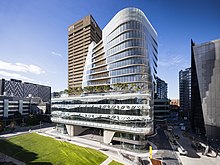UTS: Eight things you need to know about the budget
1. Jobs, jobs, jobs
This Budget is all about jobs with an unemployment rate expected to fall to 3.75 per cent after reaching 4 per cent which is already a 48 year low. This is a remarkable performance given that we have had a COVID induced recession after uninterrupted economic growth for almost three decades.
The jobs target reminds me of one of the last Accord targets of the Hawke-Keating era where the Australian Council of Trade Unions (ACTU) and the Labor Government aspired to get unemployment to 5 per cent. It seemed overly ambitious at the time, as we’d been used to double digit levels at their peak, but the target was met, and now we see unemployment falling even lower despite a global pandemic.
2. Skills, skills, skills
To rebuild Australia in a post-covid world, it’s important to re-skill Australia. As a result, the government has gone hard on apprenticeships offering $5000 payment to apprentices and $1500 in subsidies to their employers. This will help with skill shortages attracting workers to some key parts of the labour market that have been unable to get workers.
3. What about the workers?
A big problem for the government and for the Reserve Bank of Australia has been flat wages. Accordingly, the Treasurer Josh Frydenberg, has predicted wages to rise, as the unemployment rate falls in a tighter labour market. And with petrol excise stalling the rise in inflation, the Treasurer hopes there can be some real wage growth for Australian workers. The Treasurer has not taken the option of boosting the wages of public sector workers, like nurses, teachers, and emergency services workers who were stretched during the pandemic, with additional funding to the states for this purpose. Instead, he is betting on the labour market doing its thing as unemployment falls, and hoping for inflation to not be as bad as expected. A big gamble.
4. Cost of living relief
The government knows that cost of living pressures are hurting parts of the electorate, hence the 50 per cent reduction in petrol excise to provide relief to motorists (people who drive for a living, famers and families doing the school run). This will come at great expense to the budget bottom line, hence the emphasis on the measure being temporary, until after and election, oops, I mean until the relief is no longer needed. They have also provided once off payments to deal with cost of living pressures to vulnerable groups, like the aged, veterans and low and middle income earners.
5. Boost for defence
As the Treasurer mentioned this is the first budget in over 77 years where a war is raging in Europe, coupled with tensions in the South China Sea. Hence the boost for defence and particular cyber security. Some may say the government is preparing for a ‘khaki election’ but any government without an eye on defence and security in a world more dangerous than in many years would be an irresponsible government.
6. Fighting bushfires and floods
As well as covid19, Australia has experienced a ‘trifecta of tragedy’ in the past 3 years with bushfires, drought and now flooding rains. Hence the flood relief package for northern New South Wales for the Lismore area in particular a South Eastern Queensland. It’s not quite an ark but its welcome relief for those Australians affected.
Probably the biggest surprise of the Budget was climate change. I was expecting a bigger play on renewable energy to save some Coalition seats from the gang of environmentally conscious wealthy independents. Particularly given the private sector push – by companies like Fortescue Future Industries to ‘put the green back in the green and gold’. Perhaps we will see more emphasis on the environment in the election campaign than we did on budget night.
7. Don’t mention the war
It wasn’t mentioned much in the speech but the war in Ukraine cast a shadow over this budget and the potential impact for the global economy. Whilst the war has ironically boosted prices for commodities that both Australia and Russia export, like oil and natural gas, and that Ukraine, Russia and Australia like wheat, there is a possibility this will boost the Australian dollar and put pressure on services and manufacturing who are still recovering from Covid19 impacts. There are also the potential impacts of the war on our major trading partners in North East Asia who are net importers of food and energy, so the war’s impact will have significant effect on the success of the Budget’s forecasts.
8. Bottom line – deficit, what deficit?
Remember just before the last Federal Election the ‘Back in Black’ Budget of Prime Minister Scott Morrison and Treasurer Josh Frydenberg? They made a big virtue of getting the Budget back into surplus. It followed on from the ‘Debt and Deficit’ horror show Budget of Tony Abbott and Joe Hockey. It plays into the false perception that the Coalition is better at ‘balancing the books’ confusing the notion of a household budget with the Federal Budget. Economically, it made no sense but politically it played well for them.
Well that mantra is now dead and buried. The deficit is not as bad as we’d thought it be in the midst of the pandemic thanks to a stronger than expected economy, and the debt is manageable especially as it can be serviced with higher export prices. The covid19 emergency, like the Global Financial Crisis of 2008, showed that when times are tough, government’s need to step in to cushion the blow of adverse economic forces and keep the economy going. The Federal Government did so and now we have a lower than expected unemployment rate in the wake of a global pandemic. Keynes was right after all.

